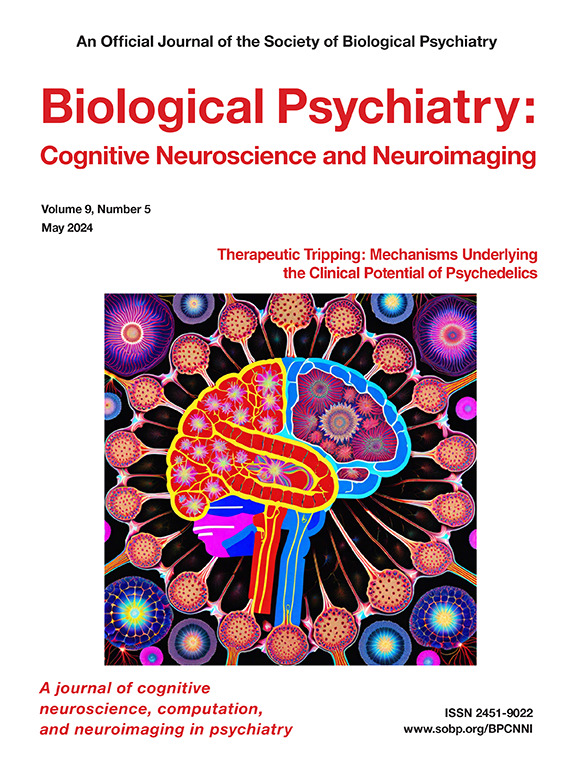社会努力折扣揭示了领域一般和社会特定的动机成分。
IF 5.7
2区 医学
Q1 NEUROSCIENCES
Biological Psychiatry-Cognitive Neuroscience and Neuroimaging
Pub Date : 2025-01-01
DOI:10.1016/j.bpsc.2024.07.020
引用次数: 0
摘要
背景:社交动机对于健康的人际关系至关重要,在一部分普通人群和许多精神疾病中,社交动机都会受到影响。然而,与非社交(如金钱)动机相比,社交动机在定量行为学研究中一直未得到充分研究,尤其是在付出社交努力的意愿方面。我们开发了一个新颖的社交努力折扣任务,并将其与货币任务相结合,以研究动机的特异性。我们预计社交任务的表现与一般动机有关,同时也会显示出与自我报告的回避倾向和社交性的选择性关系:方法:对 397 名参与者进行了分析,他们在线完成了社交和非社交努力折扣任务,并对动机和精神症状的各个方面进行了自我报告测量:结果:社交和非社交任务动机密切相关(rho=0.71 p):我们新颖的社交努力折扣任务揭示了动机的领域一般和社会特定成分。结合其他测量方法,这种方法有助于进一步研究共同的和可分离的神经行为机制,从而更好地描述正常和病理变异,并针对造成社交障碍的特定因素制定个性化干预措施。本文章由计算机程序翻译,如有差异,请以英文原文为准。
Social Effort Discounting Reveals Domain-General and Social-Specific Motivation Components
Background
Social motivation is crucial for healthy interpersonal connections and is impaired in a subset of the general population and across many psychiatric disorders. However, compared with nonsocial (e.g., monetary) motivation, social motivation has been understudied in quantitative behavioral work, especially regarding willingness to exert social effort. We developed a novel social effort discounting task, paired with a monetary task to examine motivational specificity. We expected that social task performance would relate to general motivation and also show selective relationships with self-reported avoidance tendencies and with sociality.
Methods
An analyzed sample of 397 participants performed the social and nonsocial effort discounting task online, along with self-report measures of various aspects of motivation and psychiatric symptomatology.
Results
Social and nonsocial task motivation correlated strongly (ρ = 0.71, p < .001). Both social and nonsocial task motivation related similarly to self-reported general motivation (social, β = 0.16; nonsocial, β = 0.13) and to self-reported approach motivation (social, β = 0.14; nonsocial, β = 0.11), with this common effect captured by a significant main effect across social and nonsocial conditions. Significant condition interaction effects supported a selective relationship of social task motivation with self-reported sociality and also with avoidance motivation.
Conclusions
Our novel social effort discounting task revealed both domain-general and social-specific components of motivation. In combination with other measures, this approach can facilitate further investigation of common and dissociable neurobehavioral mechanisms to better characterize normative and pathological variation and develop personalized interventions targeting specific contributors to social impairment.
求助全文
通过发布文献求助,成功后即可免费获取论文全文。
去求助
来源期刊

Biological Psychiatry-Cognitive Neuroscience and Neuroimaging
Neuroscience-Biological Psychiatry
CiteScore
10.40
自引率
1.70%
发文量
247
审稿时长
30 days
期刊介绍:
Biological Psychiatry: Cognitive Neuroscience and Neuroimaging is an official journal of the Society for Biological Psychiatry, whose purpose is to promote excellence in scientific research and education in fields that investigate the nature, causes, mechanisms, and treatments of disorders of thought, emotion, or behavior. In accord with this mission, this peer-reviewed, rapid-publication, international journal focuses on studies using the tools and constructs of cognitive neuroscience, including the full range of non-invasive neuroimaging and human extra- and intracranial physiological recording methodologies. It publishes both basic and clinical studies, including those that incorporate genetic data, pharmacological challenges, and computational modeling approaches. The journal publishes novel results of original research which represent an important new lead or significant impact on the field. Reviews and commentaries that focus on topics of current research and interest are also encouraged.
 求助内容:
求助内容: 应助结果提醒方式:
应助结果提醒方式:


